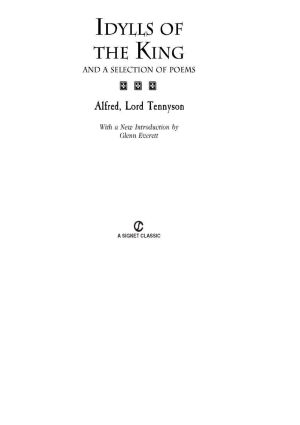Idylls of the King and a New Selection of Poems

- Authors
- Tennyson, Alfred
- Publisher
- Signet Classic
- Tags
- classics , poetry , fantasy
- ISBN
- 9781101157671
- Date
- 1889-01-01T00:00:00+00:00
- Size
- 0.37 MB
- Lang
- en
Idylls of the King, published 1856-85, is a cycle of 12 narrative poems by the English poet Alfred, Lord Tennyson (1809–92, Poet Laureate from 1850) which retells the legend of King Arthur, his knights, his love for Guinevere and her tragic betrayal of him, following the rise and fall of Arthur and his kingdom. The whole work recounts Arthur's attempt and failure to lift up humankind and create a perfect kingdom, from his coming to power to his death at the hands of the traitor Mordred. Individual poems detail the deeds of various knights, including Lancelot, Geraint, Galahad, Balin and Balan, and also Merlin and the Lady of the Lake. There is little transition between Idylls, but the central figure of Arthur links all the stories.
Tennyson based his retelling primarily on Sir Thomas Malory's Le Morte d'Arthur and the Mabinogion, but with many expansions, additions and several adaptations, a notable example of which is the fate of Guinevere. In Malory she's sentenced to be burnt at the stake but is rescued by Lancelot; in the Idylls Guinevere flees to a convent, is forgiven by Arthur, repents, and serves there until death.
Tennyson amended the traditional spellings of several names to fit the meter. The Idylls are written in blank verse (except for the last verse of the last idyll, an alexandrine). Tennyson's descriptions of nature are derived from observations of his own surroundings, collected over the course of many years.
The dramatic narratives are not an epic either in structure or tone, but derive elegiac sadness from the idylls of Theocritus. Idylls of the King is often read as an allegory of the societal conflicts in Britain during the mid-Victorian era.
Part of the work was written in the Hanbury Arms in Caerleon, where a plaque commemorates the event. The poems were dedicated to the late Albert, Prince Consort.